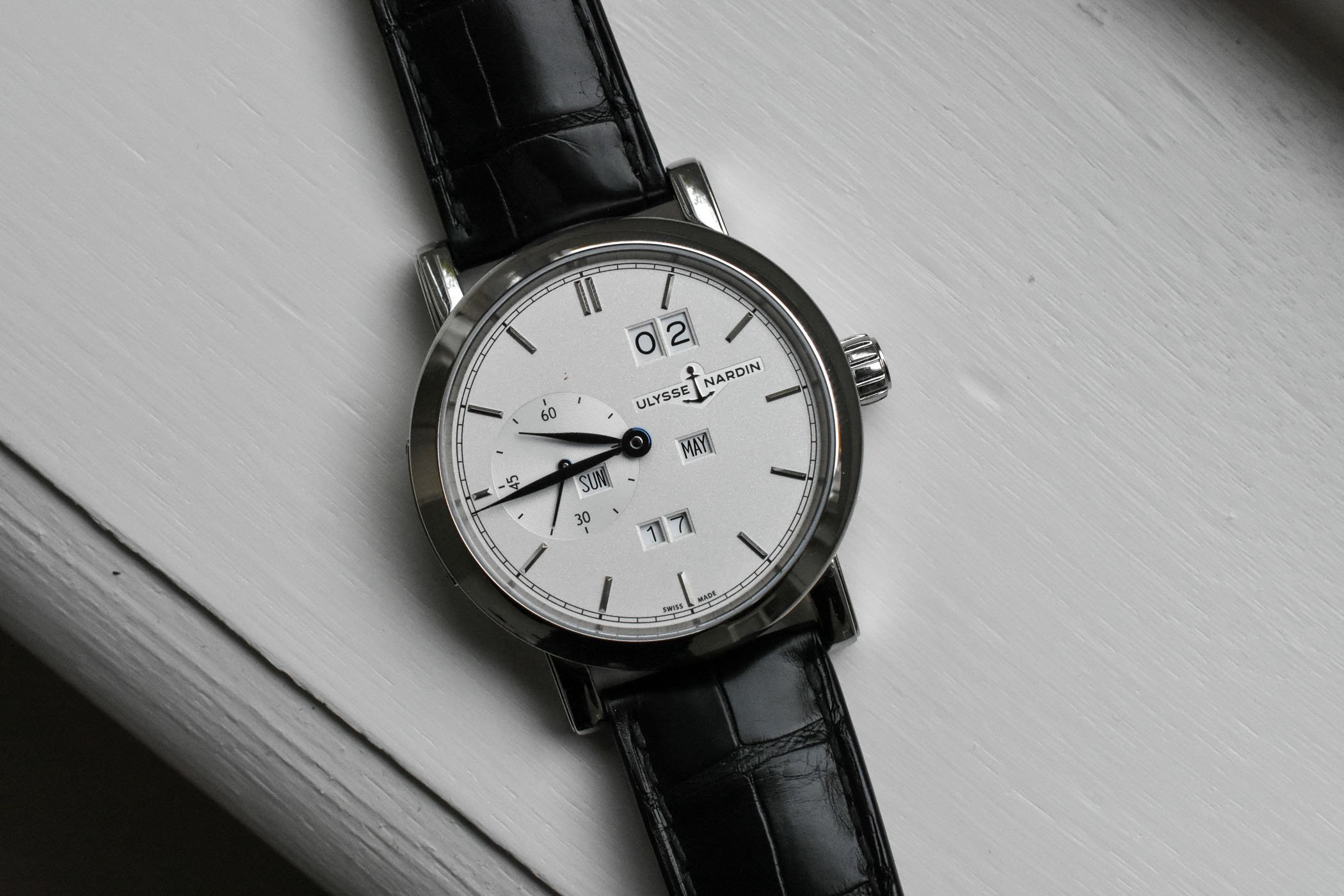Making Complex Things Simple With The Ulysse Nardin Classic Perpetual Ludwig

Today we are taking a closer look at one of the most refined and streamlined Perpetual Calendars on the market, the Ulysse Nardin Classic Perpetual Ludwig. Named after the man largely responsible for the original watch some 20 years ago, Dr. Ludwig Oechslin, this modern-day tribute is nothing short of exceptional. Easy to set and even easier to read, this complicated watch helped pioneer a new way of thinking about Perpetual Calendars. Read on to learn what makes it so special.
To say that Dr. Ludwig Oechslin is a gifted creator of complications is a gross understatement of the man’s incredible talents. Associated with Ulysse Nardin for many years, his was the creative genius that developed the Freak, the Trilogy of Time collection (a trio of watches named Astrolabium Galileo Galilei, Planetarium Copernicus and Tellurium Johannes Kepler), and of course the Perpetual Calendar he created for the brand in 1996 to celebrate its 150th anniversary. He was also heavily involved in creation of the innovative MIH Watch, the official watch of the international museum of watchmaking, the Musée International d‘Horlogerie. These days, he spends his time creating all the watches for a little independent brand he helped found called Ochs und Junior.
Oechslin’s career, and by extension, his creations, has always been marked by a “no-frills” approach focused on simplifying the complexity in high-end mechanical watchmaking. This is particularly evident in his more recent work with Ochs and Junior but it’s easy to see its origins in his earlier creations, like the original Perpetual Ludwig he created for Ulysse Nardin back in 1996.
Renowned for its simplicity, the Perpetual Ludwig went against many of the previously held theories and practices of traditional watchmaking. While other QP’s were equipped with a multi-step program wheel, not unlike the mechanisms from 100 years earlier, Dr. Oechslin’s QP design incorporated an arrangement of stacked program gears, which allowed for the bi-directional adjustment of the indications. In layman’s terms, this means that the calendar indications could be adjusted backwards or forwards as far as you like via a single crown, without any risk of damage to the movement, unprecedented in Haute Horlogerie at that time.
It was a (relatively) simple solution to a very complex problem, although it certainly provided a nice challenge for the Ulysse Nardin engineers tasked with making it a production-ready reality. While UN doesn’t supply too much in the way of specific details, it seems the consensus is that watch was based on an automatic movement supplied by Nouvelle Lemania (now Manufacture Breguet) – specifically, the Lemania 1354 chronograph movement – although I have read elsewhere that it could be the ETA 2892-A2. Whatever the case, the finished movement is known as the UN-33 and it is an exceptionally simple design for such a complication. 31mm in diameter and 6.95mm high, it featured 34 jewels and was comprised of just 223 parts.
The Classic Perpetual Ludwig, unveiled by Ulysee Nardin at SIHH 2017, pays homage to this original model. A faithful recreation in almost every way, the new version is noticeably larger at 41mm (vs. the original 38.5mm) and the design is somehow even more refined. Presented in a polished steel case paired with a silver dial that features a fine grain finish, blued steel leaf hands and facetted baton markers and, this watch takes the concept of understated style to a whole new level. In fact, to the casual observer, it’s nothing more than a nice-looking watch with a few extra windows on the dial. To the connoisseur collector however, it is a testament to the ingenious mind of Dr. Oechslin.
The lay-out of the dial is the same as the original, meaning a central display of the hours and minutes, with small seconds shown on a sub-dial at 9 o’clock. Where things get interesting of course is the calendar indications: the date is shown via dual apertures at 1 o’clock, then comes the day and the month in two separate windows towards the middle of the dial, and then finally the year (in two digits) just above 6 o’clock.
The Classic Perpetual Ludwig features the same UN-33 movement as the original, which makes sense as there’s no need to fix something that’s not broken. The only downside however, is that the movement is still 31mm, whereas the case is now larger, so the calendar displays consequently appear smaller. There still highly legible of course and in fact, if it wasn’t pointed out to you, you probably wouldn’t notice that the windows are a bit smaller.
Turning the watch over, a sapphire caseback gives a nice view of the UN-33 movement. The finishing, whilst not overly elaborate, is done to a very high standard and is offset by blue screws and the brand’s logo embedded in a sea of blue enamel in the rotor. Rated water resistant to 30m, the automatic movement offers a max power reserve of approximately 48 hours.
An unassuming looking watch if there ever was one, the Perpetual Ludwig represented a major milestone in mechanical watchmaking and is still one of the only QP’s on the market that allows you to adjust the calendar indications forward or backwards via a single crown. This latest version pays a nice homage to the original and can be yours for the very reasonable price of € 19,800 Euro.
Technical specifications – Ulysse Nardin Classic Perpetual Ludwig
- Case: 41 mm – stainless steel – sapphire crystal on both sides – water resistant to 30m.
- Movement: UN-33 – 31mm x 6.95mm – mechanical with automatic winding – 48-hour power reserve – 34 jewels – hours, minutes, small seconds – perpetual calendar – 223 parts.
- Strap: Black leather strap supplied with pin buckle.
- Price: EUR 19,800








2 responses
It will be an interesting head-to-head comparison between this watch and the Ochs Und Junior Perpetual Calendar.
May 2nd 2017 wasn’t a sunday …